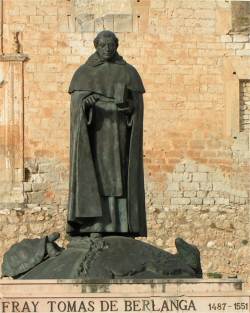Tomás de Berlanga facts for kids
Quick facts for kids Most Reverend Tomás de Berlanga |
|
|---|---|
| Bishop of Panama | |

Statue of Fray Tomás in Berlanga de Duero
|
|
| Church | Catholic Church |
| Diocese | Diocese of Panama |
| Predecessor | Vicente de Valverde |
| Successor | Pablo de Torres |
| Orders | |
| Consecration | 1534 by Francisco Mendoza de Bobadilla |
| Personal details | |
| Born | 1487 Berlanga de Duero, Spain |
| Died | 8 August 1551 (age 64) Berlanga de Duero, Spain |
| Nationality | Spanish |
Fray Tomás de Berlanga (1487 – 1551) was an important Spanish bishop and explorer. He is best known for being the fourth Bishop of Panama. He also accidentally discovered the Galápagos Islands.
Contents
Early Life and Becoming a Bishop
Tomás de Berlanga was born in 1487 in a town called Berlanga de Duero in Spain. He grew up there before starting his religious journey.
In 1534, he was chosen to become the Bishop of Panama. This was a very important role in the Catholic Church. He was officially made a bishop on May 17, 1534.
Journey to Peru and the Galápagos Islands
In 1535, Bishop Tomás de Berlanga was asked to travel to Peru. His mission was to help solve a big disagreement. Two famous Spanish explorers, Francisco Pizarro and Diego de Almagro, were arguing. They couldn't agree on how to divide the land they had conquered in the Inca Empire.
During his journey to Peru, something unexpected happened. His ship got stuck because the winds stopped blowing. Strong ocean currents then carried his ship far off course.
Discovery of the Galápagos Islands
On March 10, 1535, Bishop Berlanga's ship drifted to a group of islands. These islands were previously unknown to Europeans. He had accidentally discovered the Galápagos Islands!
He wrote a detailed letter about his adventure and the new islands. This letter was sent to Charles V, Holy Roman Emperor, who was also the King of Spain. Bishop Berlanga described the unique animals and dry landscape of the islands.
Later Life and Return to Spain
Bishop Berlanga decided to leave his position as Bishop of Panama in 1537. He then returned to his hometown in Spain.
When he came back from America, he brought a very unusual souvenir. It was a caiman, a type of reptile similar to an alligator. This caiman was 3 meters (about 10 feet) long! He had found it in the Chagres River in Panama. Today, this caiman is still on display in a church in Berlanga de Duero.
See also
 In Spanish: Tomás de Berlanga para niños
In Spanish: Tomás de Berlanga para niños
 | May Edward Chinn |
 | Rebecca Cole |
 | Alexa Canady |
 | Dorothy Lavinia Brown |

